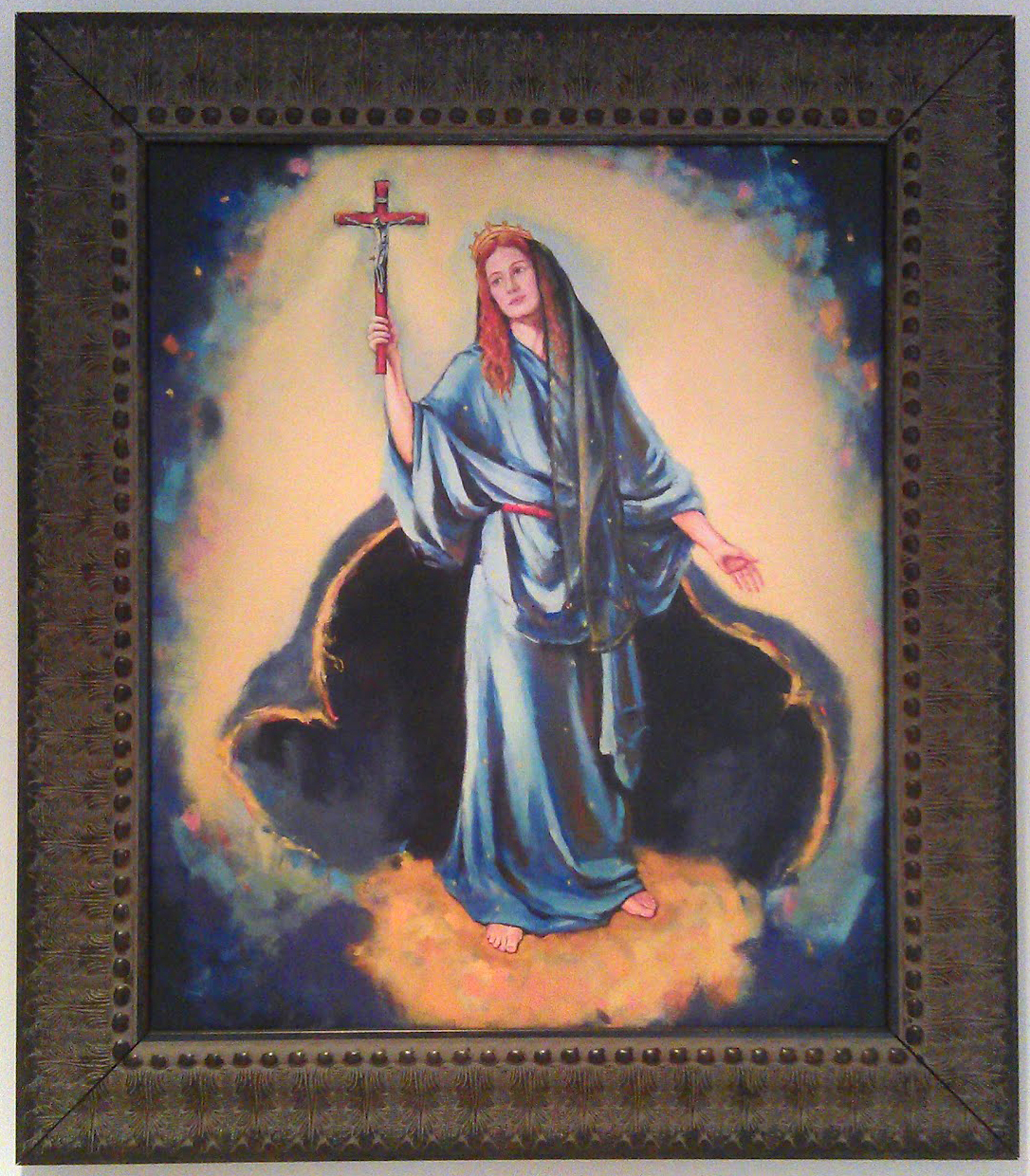The world judges harshly those who go forward in life, leaving behind them a trail of wrecked hopes and failures. I am learning, after so many years, to give thanks for every wrecked hope and to bless God for every failure. It is altogether too easy to glory in vain hopes and to boast of one's achievements (be they spiritual, academic, or material), and to forfeit the one hope held out by God, the hope that promises and delivers the only happiness that leaves no aftertaste of bitterness: hope in God for God. The value of achievements and possessions must be measured against "the One Thing Necessary . . . the Best Part." (Luke 10:42). Is not this why Our Lord says, "Blessed are the poor in spirit: for theirs is the kingdom of heaven"? (Matthew 5:3)
The Name of Jesus is enshrined, like a jewel set in a precious setting, at the very heart of today's Gospel. Even as I look at the layout of the Gospel -- it is but a single verse -- on the page of the Evangeliary, I see that the Name of Jesus occurs precisely in the middle of text. One who receives the Name of Jesus from the Gospel, and holds it in his heart, will find that it becomes there an unfailing wellspring of hope. The Name of Jesus is an anchor of hope in the soul's secret depths, a reason -- no, the only reason -- for hoping against hope when the forces of despair marshaled by the world, the flesh, and the devil, threaten to pull one into the outer darkness of complete despondency.
Our Blessed Lady and Saint Joseph
Our Blessed Lady and in Saint Joseph demonstrate and illustrate the virtue of hope, especially in the Infancy narratives of the Gospels of Saint Matthew and Saint Luke. Both of them received in secret, as it were, the adorable Name of Jesus; Our Lady from the Archangel Gabriel (Luke 1:31), even before she uttered her Fiat(Luke 1:38), and Saint Joseph from the Angel who came to him in a dream by night (Matthew 1:21). The Most Holy Name of Jesus held in their hearts and endlessly repeated became for both of them the fountain of hope that neither deceives nor confounds those who stake their very lives upon it.
Not only do Our Blessed Lady and Saint Joseph demonstrate and illustrate the virtue of hope; they also dispense it, in abundance, to the souls who seek their intercession. Our Lady, being the Mediatrix of All Graces is Spes Nostra, Our Hope. Where Mary is, there is hope. It is enough for a soul to seek the presence of Mary, and to pronounce her sweet name for hope to fill the terrible void of despair.
As for Saint Joseph, he graciously imparts the grace of hope to those who ask for his paternal help. Saint Joseph, having held fast to hope amidst darkness and trials, is now charged with helping, from his place in heaven, those who are tempted against this virtue that the powers of darkness so hate. With good reason does the Church invoke Saint Joseph as the "Terror of Demons," for when Saint Joseph enters a crisis to bring souls heavenly aid, he foils every diabolical plot to cast them into despair. (Read more.)
From First Things:
Concern for the world is a function of love. Clark finds inspiration in Franciscan spirituality, which “is founded . . . on a strong awareness of the inwardness of things.” Franciscans aren’t practical in that they don’t look for ways to bend the world to their own purposes. Their delight in creation is like falling in love. “The love experienced for all created things,” Clark suggests, “even in their weak and fallen state, even when the broken reflections of the glory cannot now be pieced together, is the only sure basis from which to care for the world.”
Like faith, hope is an essential epistemological virtue. In the words of C. S. Peirce, “the only assumption on which (the scientist) can act rationally is the hope of success” in his explorations of the logos of things. Scientists and mathematicians often follow the lure of beauty, motivated by a Keatsian expectation that beauty is truth, and truth beauty. Scientific progress hinges on hope that creation will be found to reflect the convergence of transcendentals found in the Creator.
We need hope to seek the full truth of things. As J. C. Powys said, our world resounds with “the scream of the victim in the hands of the police . . . the starvation-groan of the famished . . . the weeping of the lynched . . . the howl of the executed . . . the inert despair of the jobless.” We flinch and look away. We anesthetize ourselves with 24/7 diversions. We embrace the comforting evasions of Panglossian philosophers like Spinoza or Marcus Aurelius.
We can’t know the truth if we’re deaf to the world’s anguished shrieks, if we avert our gaze from the charnel house. But can we bear so much reality? Not, Clark argues, without hope that evils will be repaired or redeemed. Given our own capacity for evil, moreover, our hope must be directed outside ourselves. We must, Clark says, “devise some story which will make it possible to believe in a God both almighty and well-meaning, because our faith is vain if He does not play fair.” We’re on the road to saintliness when we’re gripped by “hope that the evils of the world can be, will be, remedied.” The force of Clark’s argument is more general: We embark on the road of sanity only when we walk in hope. Hope is the source of natural virtue. (Read more.)




















1 comment:
Enlist the power of praise by Praising God in ALL situations.....
Post a Comment